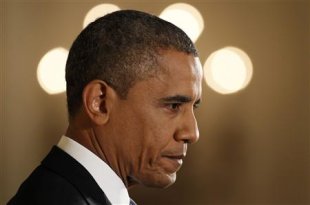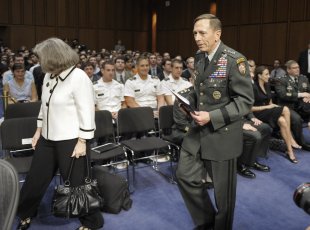
"I don't think there's any debate in this country that when you have four Americans killed that's a problem," he told reporters sternly in the East Room of the White House. "And we've go to get to the bottom of it, and there needs to be accountability, we've got to bring those who carried it out to justice --they won't get any debate from me on that."
"But when they go after the U.N. ambassador, apparently because they think she's an easy target, then they've got a problem with me," he warned.
McCain, Senator Lindsey Graham, and some other Republicans have signaled that they will oppose Rice's confirmation if Obama nominates her. Their numbers thus far seem far short of the 40 needed to block it, and some Republican Senators have signaled that she should get a fair hearing.
"Let me say specifically about Susan Rice: She has done exemplary work. She has represented the United States and our interests in the United Nations with skill, and professionalism, and toughness, and grace," Obama said.
"And should I choose, if I think that she would be the best person to serve America in the capacity of the State Department, then I will nominate her," he vowed. "That's not a determination that I've made yet."
Rice and Democratic Senator John Kerry, who chairs the Senate Foreign Relations Committee, are seen as the front-runners in the race to succeed Clinton.
Conservatives have assailed Rice, who is close to Obama, ever since she made the rounds of the Sunday morning talk shows saying that American intelligence believed that the attack on the American compound in Benghazi, which claimed the lives of U.S. Ambassador Chris Stevens and there other Americans, grew out of demonstrations against an Internet video that ridicules Islam.
"As that unfolded, it seems to have been hijacked, let us say, by some individual clusters of extremists who came with heavier weapons, weapons that, as you know, in the wake of the revolution in Libya are quite common and accessible. And it then evolved from there," she told ABC.
Republicans have seized on some of her other comments suggesting that the attack grew out of a "spontaneous, not premeditated" demonstration in response to the Internet video -- there was no demonstration. White House aides have said that Rice was speaking based on the best available intelligence at the time.
"She made an appearance at the request of the White House in which she gave her best understanding of the intelligence provided to her," Obama said Wednesday. "If Senator McCain and Senator Graham want to go after somebody, they should go after me."
"But for them to go after the U.N. ambassador, who had nothing to do with Benghazi, and was simply making a presentation based on intelligence that she had received, and to besmirch her reputation is outrageous," he said.
"We're after an election now," he scolded. "I think it is important for us to find out exactly what happened in Benghazi, and I'm happy to cooperate in any ways that Congress wants. We have provided every bit of information that we have and we will continue to provide information and we've got a full-blown investigation. And all that information will be disgorged to Congress."
Graham, who represents South Carolina, hit back quickly.
"Mr. President, don't think for one minute I don't hold you ultimately responsible for Benghazi. I think you failed as Commander in Chief before, during, and after the attack," he said in a statement released by his office.
"We owe it to the American people and the victims of this attack to have full, fair hearings and accountability be assigned where appropriate. Given what I know now, I have no intention of promoting anyone who is up to their eyeballs in the Benghazi debacle," Graham said.
Obama opened what was his first press conference in months — and first since the election that gave him a second term — with a vow to work with both parties in Congress to tackle the so-called "fiscal cliff" and revive the economy. He also said he had "no evidence" that the scandal that led David Petraeus to resign in disgrace from his job as CIA director had led to breaches in classified national security material.
"Right now our economy is still recovering from a very deep and damaging crisis, so our top priority has to be jobs and growth," Obama said in opening remarks in the East Room of the White House.
"Both parties can work together" to address the fiscal challenges "in a balanced and responsible way," he said, before pushing Republicans to sign on to his call for raising taxes on the richest Americans.
In response to the first question, regarding Petraeus, Obama said he had "no evidence at this point from what I've seen" that there had been any national security breaches. And the president praised the retired general, saying "we are safer because of the work Dave Petraeus has done."
Asked later for his appraisal of the FBI's work in bringing to light the marital infidelity that Petraeus cited in his resignation message, and why he learned of the probe only earlier this month, Obama said "I am withholding judgment" on that process but expressed "a lot of confidence generally in the FBI."
Turning to his tax battle with Republicans, Obama stuck by his vow to oppose any legislation that extends the Bush-era tax cuts for the wealthiest two percent of Americans. The president, asked why he had agreed to extend them in the 2010 lame duck session of Congress, said that "was a one-time proposition" and that "we cannot afford" to do so again.
Obama said he would be willing to look at raising tax revenues by closing loopholes but said that "the math tends not to work" when it comes to making up that way for extending the tax rate reductions on income above $250,000. And he reiterated that he does not want a stopgap agreement with Congress.
"I want a big deal, I want a comprehensive deal," he said. "Fair-minded people can come to an agreement."
Obama, who won the Latino vote by a lopsided margin, also vowed to pursue comprehensive immigration reform in his second term.
"We need to seize the moment," he said, predicting that "we will have a bill introduced and we begin the process in Congress very soon after my inauguration."











